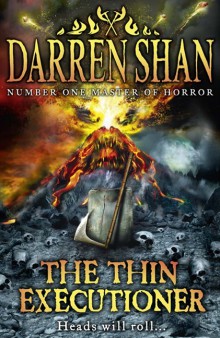Darren Shan has become one of the best-selling YA authors of recent years through his Saga of Darren Shan and Demonata books. These books have invariably contained pages and pages of gory horror, some of which gets particularly graphic at times (just read the first few chapters of Lord Loss if you doubt me). Simply put, his readers have known exactly what to expect when picking up a new Darren Shan book for the first time. However, with the imminent publication of his latest book, entitled The Thin Executioner, those days are over.
As this is The Book Zone's Horror Month I was very chuffed to receive an early review copy from HarperCollins. Little did I know that this is an entirely new direction for Mr Shan and the book fits far more comfortably into the fantasy genre than the horror genre. Yes, there are a number of his trademark gory moments, but these are definitely in the minority and for the first time the story is not set on earth. At the beginning of the book Mr Shan credits the country of Jordan and its villages as providing many of the character names for The Thin Executioner, and the ties to this country don't end there. The world inhabited by these characters is disctinctly Middle Eastern in flavour, albeit a fantastical version of the area and its cultures, and at one point our hero even comes across a 'tribe' of cliff-dwellers whose homes obviously inspired by the amazing dwelings in Jordan's Petra.
The story focuses on Jebel, the youngest son of the Chief Executioner of Wadi. This position is held in great esteem by the citizens of this region, almost to the point of garnering more respect than the country's ruler himself. Nobody is fined or imprisoned in this place, everyone who is found guilty of committing a crime very quickly finds themselves facing the dreaded axe. Unlike his father and brothers Jebel is thin and lacking in the physical qualities required for the position of Executioner, so when his father announces his retirement and fails to mention Jebel as a potential successor, Jebel decides that the only way to regain his honour is to embark on a quest. Legend has it that by making the arduous journey to the mountain of Tubaygat, with a slave willing to be sacrificed at the journey's end, then the great god Sabbah Eid will grant the questor invincibility.
I have been a huge Darren Shan fan ever since I first read Cirque du Freak. I will happily concede that he is not the best of writers, but he knows what his fans like and he has always delivered it by the truckload. However, I really did struggle to get into this book at first. I think the main reason for this is that Jebel is not a particularly pleasant main character. In fact, I think the words odious, bigoted, selfish and arrogant would be the best way to describe his personality. He is very much a product of his environment - his father's elevated status in society, the way his fellow citizens treat their slaves, the emphasis on execution as the only viable form of punishment - all these contribute to making him a particularly nasty piece of work. However, once he actually got into his quest I started to warm to the book, although it is still a long way off being my favourite from this author.
The journey that Jebel experiences is not just a physical one from Wadi to Tubaygat. Author Sarwat Chadda recently described the book as like "Pilgrim's Progress but with decapitations", and I'm not sure I could come up with a better analogy if I sat here all week as Jebel's journey is much more one of personal discovery - as the story progresses all of his deeply ingrained notions on honour, slavery, punishment and religion are challenged in one way or another. I won't spoil the story by telling you whether he is successful in his quest or of his personality is permanently changed for the better - although I didn't think this the best of Darren Shan's work it is certainly worth reading.
This book will be a big test of Darren Shan's true popularity as a writer. The story has a pleasingly fast pace for most of the book, although there are one or two painfully slow passages, but I am not sure the hard-core horror fans will enjoy this anywhere near as much as they did his other books. As I have previously mentioned, this book does contain some gory moments, and true to form Mr Shan is far from restrained in his descriptions of them (what the Um Saga do to each other under the instruction of their vile leader Qasr Bint is particularly nasty) but is there enough of this to sate his fans' appetites for all things grim? Perhaps they are ready for a story that deals with more real-life issues such as crime and punishment, personal freedom and religion? Maybe they will find the way he deals with these subjects a little too moralistic in places as I did? I feel the technical quality of the writing is an improvement on some of his other books but whether this will help sales only time will tell.
The Thin Executioner is Darren Shan's first standalone novel so who knows what he will deliver next (I really hope it doesn't contain vampires or angels). The book is published by HarperCollins and is due to be in stores on 29th April.
